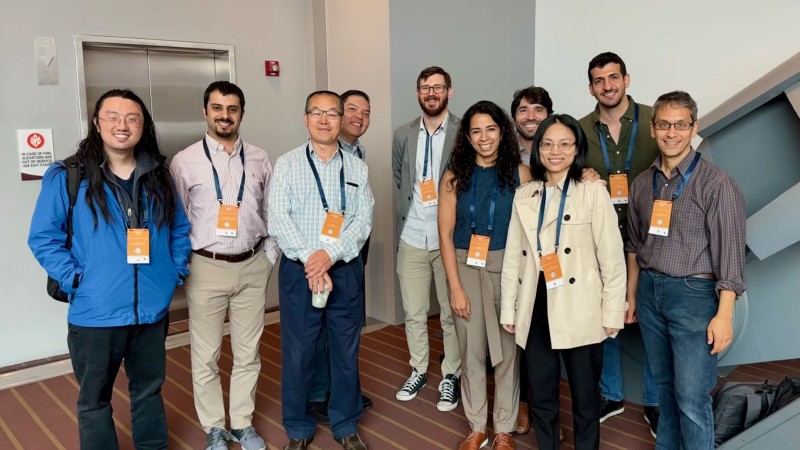Artificial Intelligence Master of Science Degree

Artificial Intelligence
Master of Science Degree
- RIT /
- Rochester Institute of Technology /
- Academics /
- Artificial Intelligence MS
The artificial intelligence MS provides transferable skills in the responsible and impactful design, development, analysis, and deployment of AI.
Overview for Artificial Intelligence MS
Why Pursue a Master's in Artificial Intelligence at RIT?
STEM-OPT Visa Eligible: The STEM Optional Practical Training (OPT) program allows full-time, on-campus international students on an F-1 student visa to stay and work in the U.S. for up to three years after graduation.
Flexible Learning: Complete your degree on RIT’s campus, via a combination of online and on-campus courses, or entirely online.
Unique AI Research Experiences: Jumpstart your graduate AI research career with NSF-funded opportunities like the AWARE-AI and AI-PROWL programs at RIT.
Customize Your Degree: Choose electives in machine learning, natural language and speech processing, robotics, and more to deepen your AI expertise. Explore your elective options below.
There is an enormous and growing demand for AI professionals across all sectors of society. This artificial intelligence master’s degree is designed for students with an interest in various AI sectors from various educational backgrounds.
You will develop well-rounded skill sets in designing, developing, and deploying AI systems, and also in understanding and analyzing AI’s impact on policy and society. A rich set of core courses prepares you with essential technical skills and knowledge.
AI Master’s Program
RIT’s artificial intelligence master’s offers you a tailored experience through your choice of electives. For example, you can study a central AI topic or an impactful domain of AI applications. You will gain career-enhancing experience through hands-on projects and course work. Prior to graduation, a capstone or an optional thesis allows you apply learned skills to evaluate or investigate an active area in artificial intelligence.
AI Curriculum
-
Core courses: You will develop a range of essential AI skills and knowledge through core courses. If necessary, there are computer programming and a mathematical bridge course available.
-
Elective courses: Make this degree your own by customizing electives to fit your goals. Develop depth in an area of special interest with electives that focus on central AI themes such as machine learning, natural language and speech processing, computer vision, robotics, sociotechnical AI analysis, and more.
- Capstone or thesis: Choose to complete a capstone course and an extra elective course or spend the equivalent of two courses on a thesis project with an individual expert advisor.
Interdisciplinary AI Curriculum
The graduate program in artificial intelligence is jointly delivered by faculty experts from four RIT colleges–Golisano College of Computing and Information Sciences, College of Liberal Arts, College of Science, and Kate Gleason College of Engineering–allowing you to grow valuable, career-enhancing interdisciplinary skills and communication competency as part of your program experience.
Careers in Artificial Intelligence
Graduates of the artificial intelligence MS are equipped with the tools and knowledge for successful careers in industry or other organizations. They will also be prepared for doctoral degree programs in a range of areas, as the impact of AI expands into established and emerging career professions.
-
Affordable Now. Valuable for Life.
Earn your master’s degree without the full price tag. With Master Up you can receive a 30% tuition scholarship for an RIT master’s degree.
-
Meet us on-campus on February 19
Learn about the programs that interest you. Hear from program faculty, speak with current graduate students, and ask the questions that will help you get one step closer to your career goals.
Careers and Cooperative Education
Typical Job Titles
| AI Engineer | Machine Learning Specialist | Software Developer |
| Entrepreneur | Research Associate | AI Policy Specialist |
| Technology Analyst | Computational Linguist |
Cooperative Education
What makes an RIT education exceptional? It’s the ability to complete relevant, hands-on career experience. At the graduate level, and paired with an advanced degree, cooperative education and internships give you the unparalleled credentials that truly set you apart. Learn more about graduate co-op and how it provides you with the career experience employers look for in their next top hires.
Cooperative education is optional but strongly encouraged for graduate students in the artificial intelligence master's degree.
Featured Work and Profiles
-
Video: RIT Computing Graduate Students Thrive in Academia and Industry
Learn more about our leading research opportunities and state-of-the-art facilities in this new video.
Read More about Video: RIT Computing Graduate Students Thrive in Academia and Industry -
Fulbright student's research applies AI to real-world problems
Diana Velychko, a Fulbright master’s student in artificial intelligence, is paving the way for more intuitive artificial intelligence (AI) systems.
Read More about Fulbright student's research applies AI to real-world problems -
Combating Deepfakes with Cutting-Edge AI
Cybersecurity Chair Matthew Wright’s "DeFake" project merges AI and journalism to help professionals detect deepfakes.
Read More about Combating Deepfakes with Cutting-Edge AI -
Using AI to Improve Ahrythmia Treatment
RIT professor Linwei Wang leads a multidisciplinary team utilizing AI to create individualized 3D imaging of a patient’s heart.
Read More about Using AI to Improve Ahrythmia Treatment -
RIT Experts Make Their Mark on Hollywood at Digital AI Summit
RIT faculty showcased their expertise in artificial intelligence and digital design at the Digital Hollywood AI Summer Summit, discussing the transformative impact of generative AI on screenwriting,...
Read More about RIT Experts Make Their Mark on Hollywood at Digital AI Summit -
Professor Explores AI’s Impact on the Future of Digital Art in Hollywood
Professor Shaun Foster highlights how AI tools are transforming art creation, speeding up processes, and democratizing content while emphasizing the need for ethical considerations and human...
Read More about Professor Explores AI’s Impact on the Future of Digital Art in Hollywood
Curriculum for 2025-2026 for Artificial Intelligence MS
Current Students: See Curriculum Requirements
Note for online students
The frequency of required and elective course offerings in the online program will vary, semester by semester, and will not always match the information presented here. Online students are advised to seek guidance from the listed program contact when developing their individual program course schedule.
Students are also interested in
Admissions and Financial Aid
This program is available on-campus or online.
On Campus
| Offered | Admit Term(s) | Application Deadline | STEM Designated |
|---|---|---|---|
| Full-time | Fall | Rolling | Yes |
| Part-time | Fall | Rolling | No |
Online
| Offered | Admit Term(s) | Application Deadline | STEM Designated |
|---|---|---|---|
| Part-time | Fall | Rolling | No |
Full-time study is 9+ semester credit hours. Part-time study is 1‑8 semester credit hours. International students requiring a visa to study at the RIT Rochester campus must study full‑time.
Application Details
To be considered for admission to the Artificial Intelligence MS program, candidates must fulfill the following requirements:
- Complete an online graduate application.
- Submit copies of official transcript(s) (in English) of all previously completed undergraduate and graduate course work, including any transfer credit earned.
- Hold a baccalaureate degree (or US equivalent) from an accredited university or college. A minimum cumulative GPA of 3.0 (or equivalent) is recommended.
- Satisfy prerequisite requirements and/or complete bridge courses prior to starting program coursework.
- Submit a current resume or curriculum vitae.
- Submit a personal statement of educational objectives.
- Submit two letters of recommendation.
- Entrance exam requirements: GRE optional for Fall 2026 applicants
- Submit English language test scores (TOEFL, IELTS, PTE Academic, etc.), if required. Details are below.
English Language Test Scores
International applicants whose native language is not English must submit one of the following official English language test scores. Some international applicants may be considered for an English test requirement waiver.
Duolingo (DET): 130
IELTS: 6.5
LanguageCert Academic: 74
PTE Academic: 60
TOEFL: 88
International students below the minimum requirement may be considered for conditional admission. Deaf and hard-of-hearing test takers with significant hearing loss do not need to take the listening and speaking sections for the TOEFL and IELTS. Each program requires balanced sub-scores when determining an applicant’s need for additional English language courses.
How to Apply Start or Manage Your Application
Cost and Financial Aid
An RIT graduate degree is an investment with lifelong returns. Graduate tuition varies by degree, the number of credits taken per semester, and delivery method. View the general cost of attendance or estimate the cost of your graduate degree.
A combination of sources can help fund your graduate degree. Learn how to fund your degree
Additional Information
Prerequisites
Applicant must have college-level credit in Python programming and mathematics.
Online Degree Information
The online MS in artificial intelligence program offers core courses online in an asynchronous modality. Bridge courses, when assigned, are also taught asynchronously. Any live class or group meetings are usually optional in bridge and core courses. Elective courses for the online program are more limited than courses in the on-campus program and their availability will vary from semester to semester. Some electives will be synchronous only. Students in the online program have access to RIT computing and library resources. The online program is part-time, with students completing 1-2 courses per semester. Students will usually spend 10-12 hours per week per class, although this depends on course content and individual background knowledge. For details about the online learning experience, contact the program contact listed on this page. RIT does not offer international student visas for online study.
Online Tuition Eligibility
The online MS in artificial intelligence is a designated online degree program billed at a discount from the on-campus rate. Additional scholarships are not offered. View the current online tuition rate.
Online Study Restrictions for Some International Students
Certain countries are subject to comprehensive embargoes under US Export Controls, which prohibit virtually ALL exports, imports, and other transactions without a license or other US Government authorization. Learners from the Crimea region of the Ukraine, Cuba, Iran, North Korea, and Syria may not register for RIT online courses. Nor may individuals on the United States Treasury Department’s list of Specially Designated Nationals or the United States Commerce Department’s table of Deny Orders. By registering for RIT online courses, you represent and warrant that you are not located in, under the control of, or a national or resident of any such country or on any such list.
Accreditation
Related News
-
November 24, 2025

RIT partners with Gallaudet University to launch research traineeship program in Universal AI
RIT is teaming up with Gallaudet University to prepare the next generation of artificial intelligence researchers and practitioners who will develop AI for everyone.
-
November 19, 2025

Venture Creations startup company is redefining breast cancer detection
BiRed Imaging, co-founded by Professor Satish Kandlikar, blends infrared camera capture, numerical simulation, and artificial intelligence-driven algorithms to accurately detect the presence, size, and location of tumors. The revolutionary process spares patients painful breast compression, radiation exposure, false alarms, and unnecessary anxiety.
-
September 8, 2025

Lecture from tech executive will explore critical thinking in an AI-powered world
Distinguished engineer Anshu Kak doesn’t believe that artificial intelligence (AI) will replace people. Instead, it can augment human capabilities—but the key is understanding how to leverage it effectively.
Contact
- Paola Pena Rodriguez
- Senior Assistant Director
- Office of Graduate Admissions
- Enrollment Management
- 585‑475‑5529
- paeges@rit.edu
- Cecilia Alm
- Artificial Intelligence Program Director
- Department of Psychology
- College of Liberal Arts
- 585‑475‑7327
- cecilia.o.alm@rit.edu

























